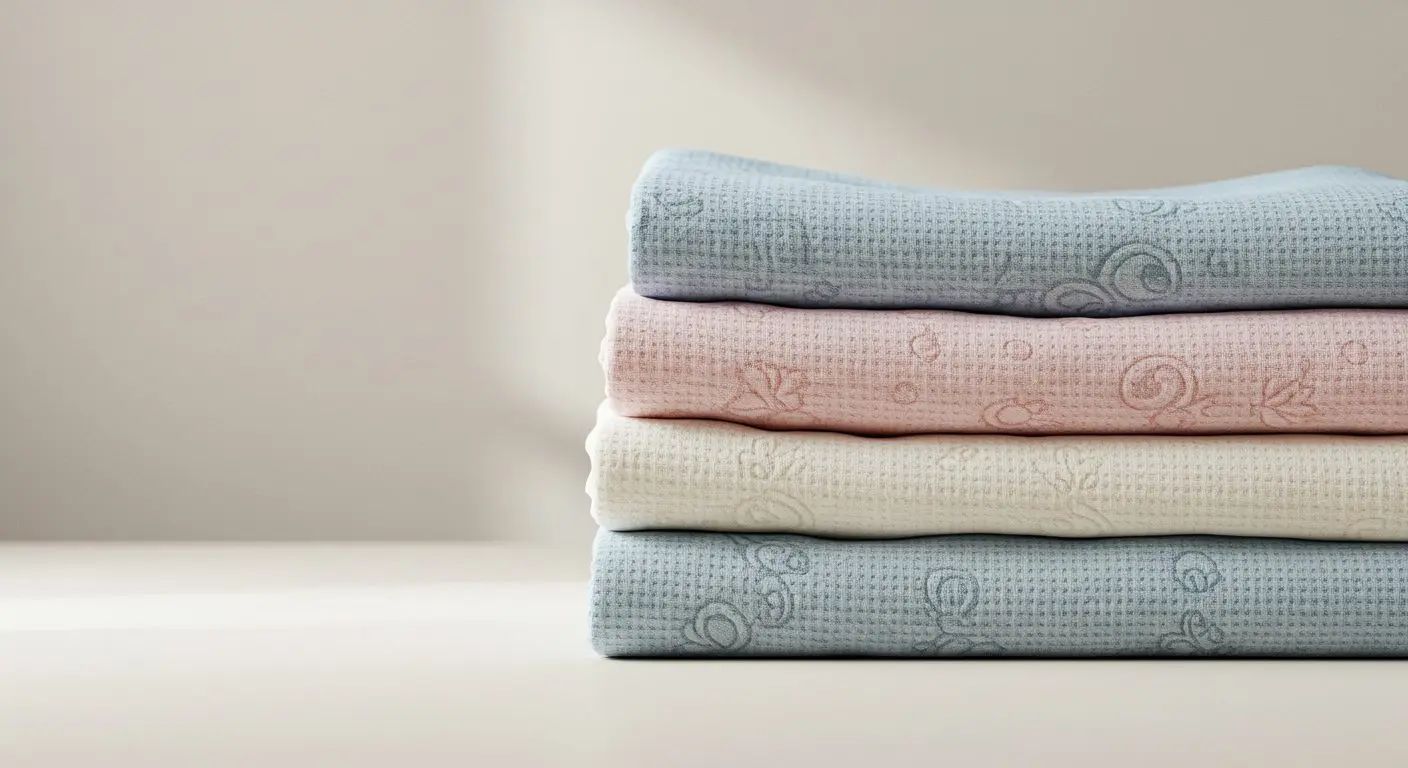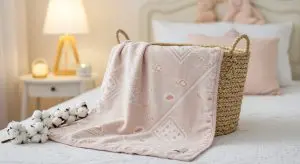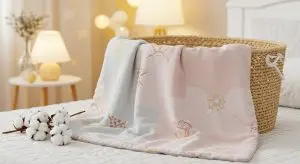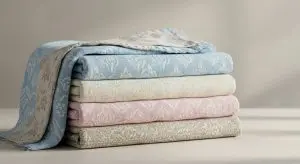From Cotton to Comfort: A Look Inside Turkish Textile Companies Shaping the Baby Blanket Market About the Industry
The baby textile market demands an extraordinary level of quality, safety, and ethical sourcing. Global retailers and private label brands are constantly searching for manufacturing partners who can consistently deliver superior products while adhering to the most stringent international regulations. Among the world’s textile hubs, Turkey has emerged as a premier source for infant textiles, particularly baby blankets. Its deep-rooted expertise in cotton, coupled with state-of-the-art manufacturing technologies, positions Turkish companies as leaders in producing items where safety and comfort are non-negotiable.
This article offers an exclusive, in-depth exploration: From Cotton to Comfort: A Look Inside Turkish Textile Companies Shaping the Baby Blanket Market | Oya Textile. We delve into the unique processes and strategic advantages that enable Turkish manufacturers to transform raw cotton fiber into the soft, durable, and safe blankets trusted by parents worldwide. Sourcing from Turkey means leveraging a supply chain renowned for its vertical integration, a process that allows manufacturers to control every step, from spinning the yarn to the final finishing process. This control is vital for maintaining the high standards required for sensitive baby products, including guaranteeing adherence to certifications like OEKO-TEX Standard 100 Class I—the gold standard for infant safety.
The narrative of Turkish textile excellence is exemplified by companies like Oya Textile, which represents the industry’s commitment to quality and innovation. They showcase the perfect fusion of traditional Turkish craftsmanship and modern, sustainable production methods. For global buyers, understanding the internal mechanisms and core philosophies of these top Turkish textile companies is crucial for making informed sourcing decisions and ensuring their product line is competitive, ethical, and of the highest quality. This commitment to meticulous production is what truly sets the Turkish market apart.
From Cotton to Comfort: A Look Inside Turkish Textile Companies Shaping the Baby Blanket Market Details
To truly appreciate the value proposition of Turkish textile companies, one must look closely at their operational models, quality standards, and strategic advantages. This section offers a comprehensive breakdown of the internal workings that position Turkey at the forefront of the baby blanket market.
The Power of Vertical Integration: From Fiber to Finished Product
One of the most significant competitive advantages held by leading Turkish textile companies is their high degree of vertical integration.
- Raw Material Mastery: Turkey’s native, long-staple Turkish cotton provides an immediate quality benchmark. Vertically integrated factories manage the ginning, spinning, and weaving/knitting processes in-house. This complete control ensures uniform fiber quality, optimal yarn count, and the foundational softness essential for baby blankets. This contrasts sharply with fragmented supply chains where material quality can be inconsistent.
- Dyeing and Finishing Precision: Controlling the dyeing process internally is crucial for baby products. Turkish companies utilize advanced, computerized dyeing machines that minimize water and chemical usage. Critically, they ensure the exclusive use of Azo-free, non-toxic dyes that meet the stringent requirements for OEKO-TEX Class I. The subsequent finishing processes, such as calendaring or brushing, are finely tuned to enhance softness without compromising the fabric’s breathability or integrity.
- Reduced Lead Times and QC: By managing all steps under one roof, these factories dramatically reduce lead times and shipping costs associated with moving materials between different contractors. More importantly, QC checks can be implemented at every phase—from yarn strength testing to finished product inspection—ensuring a remarkably low defect rate for high-volume orders.
Adherence to Global Safety and Environmental Standards
In the baby product sector, compliance is not optional; it is fundamental to the business model of top Turkish manufacturers.
- OEKO-TEX Class I: As the highest achievable certification, Class I compliance guarantees that the final product is free from hundreds of harmful chemicals and is safe for infant skin contact. Leading companies like those featured in From Cotton to Comfort: A Look Inside Turkish Textile Companies Shaping the Baby Blanket Market | Oya Textile embed this standard into their material selection and finishing protocols.
- GOTS Certification and Organic Production: Due to Turkey’s significant organic cotton production, many manufacturers hold the GOTS (Global Organic Textile Standard) certification. This standard not only validates the organic status of the cotton but also mandates strict environmental practices (e.g., wastewater treatment) and ethical labor standards throughout the factory operation.
- Ethical Audits (BSCI/Sedex): Turkish companies are increasingly audited against social compliance standards (like BSCI and Sedex) to ensure fair wages, safe working conditions, and ethical labor practices, meeting the Corporate Social Responsibility (CSR) demands of major global brands.
The Role of Technology in Baby Blanket Innovation
Turkish textile firms invest heavily in European and Japanese machinery, allowing for innovative product development.
- Precision Knitting and Weaving: They utilize specialized machinery to create innovative structures like cellular weaves and waffle knits that optimize breathability and thermal regulation—a key safety feature for baby blankets.
- Advanced Digital Printing: High-resolution digital printers allow for precise, intricate, full-color designs on soft fabrics like muslin and jersey without affecting the fabric’s drape or feel. This flexibility allows brands to quickly respond to market trends and customize patterns efficiently.
Regional Expertise and Specialization
While manufacturing occurs throughout Turkey, certain regions specialize:
- Denizli: Known as the capital for home textiles, including high-quality towels, which translates to expertise in plush materials like terry cloth and highly absorbent bamboo blends often used in hooded baby towels and bath wraps.
- Bursa: Historically strong in silks and modern knits, excelling in creating fine jersey, interlock, and premium knit blankets with complex structures.
- Istanbul: Functions as the design, sales, and logistics hub, often where specialized sourcing and brand management teams are located, facilitating international partnerships.
From Cotton to Comfort: A Look Inside Turkish Textile Companies Shaping the Baby Blanket Market
The key features of Turkish-made baby blankets are centered on ensuring superior safety, comfort, and longevity—attributes that build consumer loyalty.
Uncompromising Safety and Skin-Friendly Materials
The primary feature is the safety profile, achieved through meticulous material selection and processing.
- Hypoallergenic and Ultra-Soft Finish: Blankets undergo specialized finishing processes to ensure an extremely soft hand-feel while remaining hypoallergenic. This is guaranteed by the OEKO-TEX Class I standard, which eliminates common skin irritants and harmful residuals.
- Optimal Breathability: The design feature prioritizes breathability. Turkish manufacturers specialize in lightweight, open-weave fabrics like crinkle muslin (hydrophilic cotton) and cellular blankets, which are essential for reducing the risk of overheating and promoting safe sleep.
Design Versatility and Product Durability
Turkish factories balance aesthetic appeal with practical durability for products that are washed frequently.
- Colorfastness and Longevity: By utilizing advanced reactive and vat dyeing techniques during the vertical process, blankets exhibit superior colorfastness, resisting fading and bleeding even after hundreds of machine washes, thereby extending the product lifespan.
- Custom Embellishment and Branding: Features include precise capabilities for embroidery, appliqué, and custom trim integration. This enables complex private labeling and branded personalization, distinguishing high-end baby lines.
Strategic Logistical and Fulfillment Capabilities
Beyond the product itself, the top Turkish companies offer critical logistical features.
- E-commerce Ready Packaging: Manufacturers deliver products that are ready for retail shelves or e-commerce fulfillment, including custom poly-bagging, application of UPC codes/FNSKU labels, and customized gift-box packaging, dramatically simplifying the buyer’s supply chain.
- Inventory and Production Transparency: Advanced ERP systems allow buyers to track their order status, material consumption, and production schedules in near real-time, providing transparency into the process from From Cotton to Comfort: A Look Inside Turkish Textile Companies Shaping the Baby Blanket Market | Oya Textile to your warehouse.
From Cotton to Comfort: A Look Inside Turkish Textile Companies Shaping the Baby Blanket
The applications of baby blankets sourced from Turkish textile companies span the entire retail ecosystem, from clinical settings to high-fashion children’s wear.
I. High-End Boutique and Eco-Conscious Retailers
This segment demands certified ethical production and unique, premium aesthetic qualities.
A. Application in GOTS-Certified Organic Swaddling Lines
Manufacturers apply their GOTS certification to create luxurious, organic cotton swaddle sets. These products target consumers prioritizing environmental impact and superior material softness.
Developing Ultra-Soft Bamboo-Cotton Blend Blankets for Delicate Skin
The application here is the blending of high-quality Turkish cotton with bamboo viscose to maximize the fabric’s drape, softness, and natural anti-bacterial properties for premium infant apparel.
B. Focus on Exclusive, Small-Batch, Personalized Collections
The factories utilize their flexible production lines to produce limited-run, personalized blankets featuring custom embroidery or appliqué work, supporting the high-margin nature of boutique retail.
II. Mass-Market and Large Distributor Sourcing
This area focuses on high volume, standardized quality, and cost-efficient production for widespread distribution.
A. High-Volume Production of Essential Receiving Blankets
The application involves the efficient, industrial-scale production of standardized cotton or fleece receiving blankets, emphasizing low cost-per-unit while strictly maintaining OEKO-TEX safety standards.
Optimizing Production for Rapid Replenishment and Global Shipping
The factory’s logistical systems are applied to manage vast quantities, ensuring efficient palletization and container loading for global shipping, capitalizing on Turkey’s swift transit times.
B. Durable Construction for Wash-and-Wear Longevity
Blankets are engineered with reinforced stitching and durable finishes to withstand frequent, industrial laundering, a key requirement for items sold in major chain stores.
III. Institutional and Healthcare Supply
This specialized application requires compliance with medical-grade hygiene and durability standards.
A. Manufacturing Hospital-Grade Cellular Blankets
Turkish manufacturers produce cellular blankets specifically designed for hospital use. The critical application here is the precise weave structure that ensures maximum breathability, meeting healthcare safety protocols for infant sleeping environments.
Meeting Institutional Flammability and Sterilization Requirements
Factories use specialized, fire-retardant, and highly resilient materials and dyes that can endure harsh chemical sterilization processes required in clinical settings without degrading the material.
B. Custom Branded and Clinical Swaddle Solutions
The application includes manufacturing custom-sized swaddles with subtle institutional branding (e.g., printed logos) for hospital discharge kits, providing a reliable, safe product for new parents.
Usage Examples of Baby Blankets Sourced from Turkish Manufacturers
These examples demonstrate the specific capabilities and strategic advantages offered by the best Turkish textile companies.
Usage Example 1: The Organic Muslin Swaddle Blanket Line
A. Ensuring Seed-to-Shelf Traceability
A leading North American ethical brand collaborates with a Turkish GOTS-certified factory. The factory utilizes only locally sourced organic cotton, providing documentation that traces the fiber from the Turkish farm through its entire vertical process—spinning, weaving, and finishing. This verifiable transparency allows the brand to proudly market its ethical footprint.
B. Integrating Eco-Conscious Packaging
In addition to the GOTS-certified production, the manufacturer develops bespoke packaging using recycled, unbleached cardboard and natural twine closures instead of plastic, ensuring the entire product—from cotton to comfort—is aligned with the brand’s zero-waste commitment.
Usage Example 2: The Innovative Thermal Regulating Knit Blanket
A. Custom Fabric Development for All-Season Use
A German innovation-focused baby brand commissions a factory to create an all-season thermal regulating blanket. The Turkish partner’s R&D team develops a unique blend of micro-modal and premium Turkish cotton with a specialized hollow-core knit structure. This engineering allows the fabric to wick moisture effectively and provide insulation without bulk.
B. Precise Color Matching and Trend Execution
The factory uses advanced color analysis technology to perfectly match the brand’s seasonal Pantone colors for their limited-edition collection. The ability to execute small-batch, precise color dyeing ensures the brand maintains its fashion-forward market positioning without carrying excess inventory.
Usage Example 3: The Personalized Micro-Fleece Gift Set
A. Rapid Personalization and Fulfillment Integration
An international e-commerce platform specializing in baby gifts partners with a flexible Turkish factory. The manufacturer sets up a dedicated production cell for personalized embroidery. Orders received by 1 PM are embroidered with the baby’s name on a pre-manufactured blanket, packaged in a custom gift box, and prepared for shipping within 24 hours.
B. Quality Control for High-Volume, Low-Value Goods
Even for the more budget-friendly fleece material, the factory implements a stringent QC process, focusing specifically on anti-pilling treatments and seam integrity to ensure the high volume of personalized gifts still meets a satisfactory standard of quality upon arrival.
Usage Example 4: The Wholesale Swaddle Blanket Line for Discount Retailers
A. Cost Optimization Through Efficient Vertical Production
A large European discount chain sources massive quantities of basic muslin swaddles. The Turkish factory, through its complete vertical control of the process, optimizes the weave density and yarn count to maximize material efficiency while meeting the minimum required softness and breathability standards. This focus on efficiency drives down the cost-per-unit significantly.
B. Bulk Packaging and Direct Port Shipment
Instead of individual packaging, the blankets are bulk-packed in cartons of 50, reducing labor and packaging costs. The factory then manages the direct shipping logistics to the retailer’s designated port, maximizing cost savings and utilizing Turkey’s competitive freight rates to ensure a low landed cost.
From Cotton to Comfort: A Look Inside Turkish Textile Companies Shaping the Baby Blanket Market Sıkça Sorulan Sorular (FAQ)
Q1: What specific safety certifications should I demand when sourcing baby blankets in Turkey?
The primary and non-negotiable certification is OEKO-TEX Standard 100 Class I. This highest class guarantees the product is rigorously tested and free of harmful substances, making it safe for babies up to 36 months. If you are sourcing organic products, the factory must also possess valid GOTS (Global Organic Textile Standard) certification, confirming ethical and environmental compliance throughout the production chain.
Q2: How does vertical integration affect the final cost of Turkish baby blankets?
While the initial unit cost of a Turkish-made blanket might appear slightly higher than alternatives, vertical integration often leads to lower total landed costs and better long-term value. This is because vertical control reduces waste, minimizes logistics fees between different subcontractors, shortens lead times, and, most importantly, reduces the risk of quality defects, minimizing costly returns and recalls. The efficiency and quality control gained from From Cotton to Comfort: A Look Inside Turkish Textile Companies Shaping the Baby Blanket Market | Oya Textile operations typically outweigh perceived initial cost differences.
Q3: Are Turkish textile companies embracing sustainable manufacturing practices?
Yes, environmental sustainability is a major focus. Many leading Turkish factories utilize advanced technologies like wastewater treatment plants and closed-loop water systems to minimize their environmental footprint. The country’s commitment to organic cotton farming, combined with GOTS certification requirements, positions Turkish manufacturers as strong partners for brands committed to eco-conscious sourcing.
Q4: What is the typical MOQ for custom digital printing on baby blankets in Turkey?
MOQs for digital printing are often more flexible than for custom dye-jobs or weaving. While a large manufacturer might require 800 to 1,500 units for a basic blanket, digital printing allows for multiple designs (or SKUs) within a single production run. You might be able to achieve a custom print run starting around 500 units per design, provided the overall batch order meets the factory’s minimum threshold.
Q5: How reliable are shipping and logistics from Turkey compared to other major textile centers?
Turkey holds a distinct geographical advantage. Its shipping times to the EU and the Middle East are dramatically shorter (often 1-4 weeks faster) than those from Asia. Furthermore, its position within the EU Customs Union simplifies customs procedures and tariffs for European buyers, offering a significant logistical and financial edge, especially for time-sensitive inventory replenishment.
Q6: What does the LSI keyword, “From Cotton to Comfort: A Look Inside Turkish Textile Companies Shaping the Baby Blanket Market | Oya Textile Modelleri,” tell buyers?
The Turkish term “Modelleri” means “Models” or “Styles.” Its inclusion signals the manufacturer’s design and product diversity. It assures buyers that Turkish companies are not limited to one type of blanket but offer a wide catalog of styles, including muslin, knit, fleece, cellular, and bamboo blends, allowing brands to curate a diverse and comprehensive product line.
Q7: Can Turkish manufacturers assist with intellectual property (IP) protection for new designs?
Reputable Turkish manufacturers understand the importance of IP protection. They typically require Non-Disclosure Agreements (NDAs) before working on proprietary designs. The advanced, integrated nature of their facilities also means less risk of designs or patterns being leaked or copied by outside subcontractors, offering a more secure manufacturing environment.
The Strategic Value of Turkish Textile Partnership
The journey From Cotton to Comfort: A Look Inside Turkish Textile Companies Shaping the Baby Blanket Market | Oya Textile reveals a sophisticated industry defined by quality control, ethical compliance, and technological innovation. For global businesses, partnering with a leading Turkish manufacturer offers a strategic advantage: superior product safety, rapid time-to-market, and transparent, ethical sourcing. By leveraging the vertical expertise and quality commitment of companies like Oya Textile, buyers secure a robust, high-value supply chain that perfectly aligns with the demands of the modern, conscious consumer.




